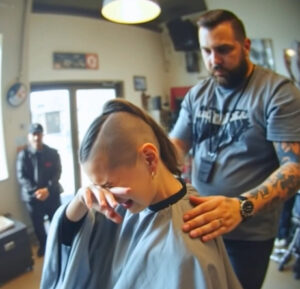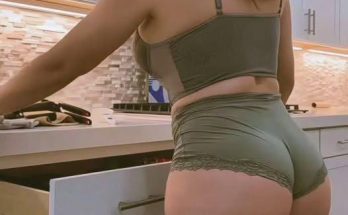
The young woman sat quietly in the barbershop chair, her hands folded tightly in her lap. Every now and then, she brushed them over her knees as if to calm herself, but nothing seemed to help.
Strands of her hair slipped through her fingers and fell softly to the floor, a physical reminder of the loss she had been silently fighting for months.
The hum of the clippers in the background was constant, a mechanical drone that somehow matched the thundering of her own heart.
She tried to focus on the sound, tried to lose herself in the rhythm, but her thoughts kept returning to the moments she had spent examining herself in the mirror at home — seeing more hair on the pillow, more strands in the shower drain, feeling a quiet panic that no one around her seemed to notice.
Her eyes stung, and tears slid down her cheeks. She did not attempt to wipe them away. There was a rawness to this moment, a private grief that demanded acknowledgment.
Each fall of hair seemed symbolic, each tiny strand a piece of her confidence, of her identity, slipping away. The young woman swallowed hard, trying to steady her breathing, feeling a lump form in her throat.
The world continued around her — the faint chatter of customers, the snip of scissors in the distance, the occasional laugh from someone at the front counter — but for her, it felt like time had slowed, narrowed down to the small space of the chair and the relentless buzz of the clippers.
Then, as if cutting through the heavy silence that enveloped her, she felt a gentle hand on her shoulder. She flinched at first, startled, but when she looked up, she saw Jake standing beside her.
Jake, with broad shoulders and a kind, weathered face that somehow carried both strength and softness, looked at her with quiet understanding. Without saying a word, he removed his cap, revealing thick, dark hair that fell in soft waves.
Slowly, deliberately, he reached for a pair of clippers, turned them on, and began shaving his own head.
Her breath caught. She could not speak. She only watched as the hair fell in clumps around him. The room was still for a moment, the buzzing of the clippers the only sound. The other barbers looked on, some hesitating, some confused.
Then, as if inspired by Jake’s silent courage, they, too, picked up clippers and began shaving their heads. One by one, the barbers began to reveal themselves in the same vulnerable way, the hum of the clippers becoming a chorus of solidarity.
This was not about fashion, not about style or bravado. This was about something much deeper: a statement that she was not alone, that her struggle was seen, that her pain was acknowledged.
The young woman stared at the growing pile of hair on the floor, hers intermingling with theirs. Each buzz of the clippers seemed to speak directly to her: you are not alone, you are supported, you are not defined by your loss.
Her chest tightened as emotion surged, a mix of sorrow and relief, vulnerability and unexpected hope. She had come in expecting to feel shame and isolation, but instead, she felt connection.
The tough, burly men she had assumed were unfeeling or intimidating had opened their hearts in the most profound, unspoken way.
Tears streamed down her face freely now, but they were different than before. These were tears of gratitude, of recognition, of relief.
She could feel the weight that had pressed on her chest for weeks begin to lift, replaced by something warm and grounding. Jake caught her gaze, and with a small, understanding smile, he said softly, “We’re all in this together, kid.”
Her lips trembled, and she let out a shaky laugh, a sound that surprised her. It felt fragile, but it also felt like a release.
She looked around the barbershop. Everyone, including herself, was now bald. The mirror reflected a room full of vulnerability, courage, and solidarity.
She saw herself mirrored in their actions, in their willingness to stand beside her, and she realized that strength was not the absence of fear, but the courage to face it — sometimes alone, sometimes together.
She touched her scalp, feeling the smoothness, and for the first time, she did not recoil. Instead, she felt a strange sense of freedom.
Jake, noticing her hesitation, leaned slightly closer and whispered, “It doesn’t hurt to be brave, and it doesn’t mean you’re alone.” She smiled through her tears, letting the words sink in.
The small, quiet barbershop had transformed into a sanctuary. Pain had become a shared experience, loss had become a bond, and sorrow had been replaced by an unspoken, palpable compassion.
When she stepped outside, the cool wind brushed against her bare scalp. She expected it to sting, to remind her of what she had lost, but it didn’t. Instead, it felt refreshing, cleansing.
Each breath of air carried with it the memory of what had just happened — a kindness so profound that it would stay with her long after she left the street.
She walked with a newfound lightness, feeling stronger, more grounded, and quietly proud of herself for facing a fear she had once thought insurmountable.
For the first time in months, she felt seen. She felt understood. She felt connected. She was no longer just a woman facing loss — she was a woman surrounded by courage, by empathy, by solidarity.
And in that, she discovered something that no hair, no illness, no hardship could ever take from her: she was never truly alone.
The young woman sat quietly in the barbershop chair, her hands folded tightly in her lap. Every now and then, she brushed them over her knees as if to calm herself, but nothing seemed to help.
Strands of her hair slipped through her fingers and fell softly to the floor, a physical reminder of the loss she had been silently fighting for months.
The hum of the clippers in the background was constant, a mechanical drone that somehow matched the thundering of her own heart.
She tried to focus on the sound, tried to lose herself in the rhythm, but her thoughts kept returning to the moments she had spent examining herself in the mirror at home — seeing more hair on the pillow, more strands in the shower drain, feeling a quiet panic that no one around her seemed to notice.
Her eyes stung, and tears slid down her cheeks. She did not attempt to wipe them away. There was a rawness to this moment, a private grief that demanded acknowledgment.
Each fall of hair seemed symbolic, each tiny strand a piece of her confidence, of her identity, slipping away. The young woman swallowed hard, trying to steady her breathing, feeling a lump form in her throat.
The world continued around her — the faint chatter of customers, the snip of scissors in the distance, the occasional laugh from someone at the front counter — but for her, it felt like time had slowed, narrowed down to the small space of the chair and the relentless buzz of the clippers.
Then, as if cutting through the heavy silence that enveloped her, she felt a gentle hand on her shoulder. She flinched at first, startled, but when she looked up, she saw Jake standing beside her.
Jake, with broad shoulders and a kind, weathered face that somehow carried both strength and softness, looked at her with quiet understanding. Without saying a word, he removed his cap, revealing thick, dark hair that fell in soft waves.
Slowly, deliberately, he reached for a pair of clippers, turned them on, and began shaving his own head.
Her breath caught. She could not speak. She only watched as the hair fell in clumps around him. The room was still for a moment, the buzzing of the clippers the only sound. The other barbers looked on, some hesitating, some confused.
Then, as if inspired by Jake’s silent courage, they, too, picked up clippers and began shaving their heads. One by one, the barbers began to reveal themselves in the same vulnerable way, the hum of the clippers becoming a chorus of solidarity.
This was not about fashion, not about style or bravado. This was about something much deeper: a statement that she was not alone, that her struggle was seen, that her pain was acknowledged.
The young woman stared at the growing pile of hair on the floor, hers intermingling with theirs. Each buzz of the clippers seemed to speak directly to her: you are not alone, you are supported, you are not defined by your loss.
Her chest tightened as emotion surged, a mix of sorrow and relief, vulnerability and unexpected hope. She had come in expecting to feel shame and isolation, but instead, she felt connection.
The tough, burly men she had assumed were unfeeling or intimidating had opened their hearts in the most profound, unspoken way.
Tears streamed down her face freely now, but they were different than before. These were tears of gratitude, of recognition, of relief.
She could feel the weight that had pressed on her chest for weeks begin to lift, replaced by something warm and grounding. Jake caught her gaze, and with a small, understanding smile, he said softly, “We’re all in this together, kid.”
Her lips trembled, and she let out a shaky laugh, a sound that surprised her. It felt fragile, but it also felt like a release.
She looked around the barbershop. Everyone, including herself, was now bald. The mirror reflected a room full of vulnerability, courage, and solidarity.
She saw herself mirrored in their actions, in their willingness to stand beside her, and she realized that strength was not the absence of fear, but the courage to face it — sometimes alone, sometimes together.
She touched her scalp, feeling the smoothness, and for the first time, she did not recoil. Instead, she felt a strange sense of freedom.
Jake, noticing her hesitation, leaned slightly closer and whispered, “It doesn’t hurt to be brave, and it doesn’t mean you’re alone.” She smiled through her tears, letting the words sink in.
The small, quiet barbershop had transformed into a sanctuary. Pain had become a shared experience, loss had become a bond, and sorrow had been replaced by an unspoken, palpable compassion.
When she stepped outside, the cool wind brushed against her bare scalp. She expected it to sting, to remind her of what she had lost, but it didn’t. Instead, it felt refreshing, cleansing.
Each breath of air carried with it the memory of what had just happened — a kindness so profound that it would stay with her long after she left the street.
She walked with a newfound lightness, feeling stronger, more grounded, and quietly proud of herself for facing a fear she had once thought insurmountable.
For the first time in months, she felt seen. She felt understood. She felt connected. She was no longer just a woman facing loss — she was a woman surrounded by courage, by empathy, by solidarity.
And in that, she discovered something that no hair, no illness, no hardship could ever take from her: she was never truly alone.


